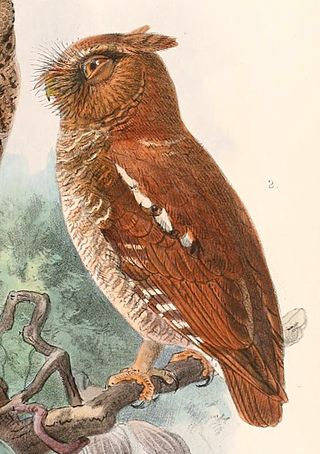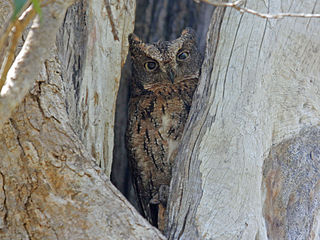
The collared scops owl is an owl which is a resident breeder in south Asia from northern Pakistan, northern India, Nepal, Bangladesh, the Himalayas east to south China, and Taiwan. It is partially migratory, with some birds wintering in India, Sri Lanka and Malaysia. This species was formerly considered to be included within what is now separated as the Indian scops owl.

Scops owls are typical owls in family Strigidae belonging to the genus Otus and are restricted to the Old World. Otus is the largest genus of owls with 59 species. Scops owls are colored in various brownish hues, sometimes with a lighter underside and/or face, which helps to camouflage them against the bark of trees. Some are polymorphic, occurring in a greyish- and a reddish-brown morph. They are small and agile, with both sexes being compact in size and shape. Female scops owls are usually larger than males.

The Indian scops owl is a species of owl native to South Asia.

The Philippine scops owl is a common owl, endemic to the Philippines, belonging to the family of the typical owls Strigidae. Other common names include "Otus Whitehead", "Whitehead scops owl" and "Luzon lowland scops owl". Everett's scops owl and Negros scops owls were formerly considered conspecific but are now classified as separate species.
The Karthala scops owl, also known as the Grand Comore scops owl or Comoro scops owl, is a small scops owl endemic to the island of Grande Comore in the Comoro Islands.
The Moheli scops owl is a scops owl endemic to the island of Mohéli, one of the Comoro Islands.

The African scops owl is a small owl which is widespread in sub-Saharan Africa.

The Seychelles scops owl, also known as bare-legged scops owl or syer is a rare scops owl species, which only occurs in the Morne Seychellois National Park on the Seychelles island of Mahé.

The sandy scops owl, or cinnamon scops owl, is an owl from the family Strigidae found in Africa.

The Sokoke scops owl is a highly localized species of scops owl found in lowland forests of Kenya and Tanzania. The greatest population of this species of owl is in the Cynometra-Manilkara forest, which is less than one-third of the Sokoke Forest. It is also found in the Afzelia-Cynometra forest.

The Flores scops owl is an owl endemic to the island of Flores, Indonesia. It is threatened by habitat loss. This owl is around 19–21 cm from head to tail. They are a forest dwelling owl that is smallish in size. Some 250–2,499 individuals are estimated to be extant in the wild, dwindling due to habitat loss.

The red-chested owlet is a species of owl in the family Strigidae, native to the African tropical rainforest. Its habits and behaviour are poorly known.

The São Tomé scops owl is a species of owl in the true owl family, Strigidae. It is endemic to São Tomé Island, part of São Tomé and Príncipe, in the Gulf of Guinea, off the western equatorial coast of Central Africa.

The Mayotte scops owl is a species of owl in the family Strigidae. It is endemic to the island of Mayotte in the Comoros.

The Pemba scops owl is a species of owl in the family Strigidae. It is endemic to Pemba Island which is part of and off the coast of Tanzania.

The Madagascar scops owl, also known as the Malagasy scops owl or Rainforest scops owl, is a species of owl in the family Strigidae. It is found throughout Madagascar, now that is has recently been lumped with the Torotoroka scops owl, with which it was long considered a separate species from. The nominate O. r. rutilus is referred to as Rainforest scops owl.
The Cyprus scops owl is a small owl endemic to Cyprus.














